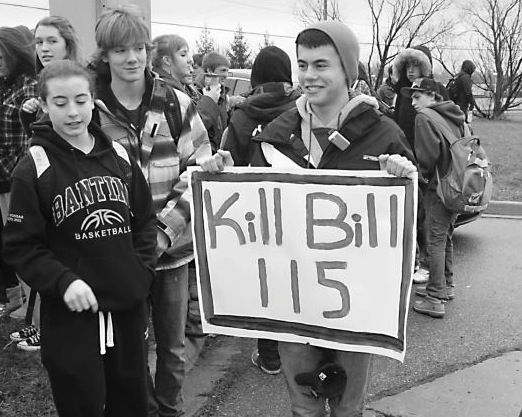Change the conversation, support rabble.ca today.
On Monday thousands of students across Ontario protested the Liberals’ Bill 115, also known as the “Putting Students First Act,” after the Ontario Secondary School Teachers’ Federation (OSSTF) ordered teachers to no longer provide after-school extra-curricular activities.
The Elementary Teachers’ Federation of Ontario (ETFO) also began rotating one-day walkouts on Monday, but it was clear that students were walking out en-masse over the job action by the OSSTF.
Piecing together media reports shows there were protests at approximately 60 schools across Ontario the vast majority of them being organized walkouts where students protested in front of their schools and in some cases marched to local MPP’s constituency offices to protest, including that of conservative leader Tim Hudak by students from Beamsville District Secondary School.
While there was a strong anti-government message, with chants of “Kill the bill!” and calls for the government to repeal Bill 115 a common theme in many of the protests by students was not only that they supported their teachers but also that they wanted their extra-curricular activities back.
This mirrored the messages that students sent back in September, when a spontaneous boycott of extra-curricular activities by some teachers angry at Bill 115 sparked a similar wave of student walkouts.
Phil den Hollander was an organizer of the walkout at Westminster Secondary School in London, Ont. that saw 300 students march from the school to picket Liberal MPP Chris Bentley’s constituency office for two hours.
den Hollander said, “As students we’re here supporting our teachers, showing them that we don’t appreciate Bill 115, we don’t want it, and it should be repealed.”
“I have some friends on the girls volleyball team who just started their first ever school sport and because of this it was cancelled,” said den Hollander. “We just decided we should stand up, we should get our voices out there because the teachers are trying, but if we help them out it might go a lot faster.”
Asked if teachers had influenced the protest, Tina Uka, 18, who is also a student at Westminster Secondary School said, “No. Actually, they’re not allowed to discuss it. Students have tried to talk with them about it, but they’re not allowed to discuss it in the classroom.”
This was the first protest that den Hollander and Uka had ever helped organize or even attended.
“This bill is taking rights away from the teachers, sooner or later we’re going to be in the workforce and this might eventually turn to our rights if there’s unfair conditions then we won’t be able to strike against those.” said Uka about her personal motivation for protesting Bill 115, “If the government is able to take away the rights of the teachers, then who knows what will happen next?”
Bentley was not available for comment.
Students in Toronto plan a city-wide walkout on Thursday at 1 p.m. Over 2000 people have said they will be attending on the event’s Facebook page, with another 1000 as maybe and 9400 more people invited. They plan to walk out of schools across the city and converge on Queens Park in a mass protest against Bill 115.
On the Facebook page the organizers wrote “Unions have been head-locked into a bad position, where all they have left to fight the bill with is eliminating our extra-curricular activities. For months the teachers have attempted to fight this bill without affecting us, but they have been forced into more drastic methods of strike. By removing this bill, we will end the strike, therefore getting back all extra-curricular activities.”
Premier Dalton McGunity has so far walked a fine line with the ETFO strikes declining to use the powers of Bill 115 to force the teachers back to work.
“While inconvenient, these one-day legal strike actions do not warrant the intervention of the government,” said McGunity in a statement on Monday.
However, Education Minister Laurel Broten threatens to use the powers of Bill 115 should the strikes escalate to two consecutive days.
McGuinty later called on the OSSTF to resume extra-curricular activities but ruled out making them a mandatory part of teachers’ jobs.
Paul Bocking, an executive officer of the the Occasional Teachers Bargaining Unit of the OSSTF in Toronto said, “Student organizing seems very decentralized, which is good because the government can’t control the students. The government can threaten to fine and jail teachers but they can’t fine or imprison students for doing walkouts.”
So far, there has been no sign that either the school boards and the unions are moving any closer to a resolution before the Dec. 31 deadline. One fundamental problem is that the boards are restricted by Bill 115 and must follow the pattern outlined in the legislation which the unions consider unacceptable.
With the Ontario Legislature prorogued and winter break almost here it seems unlikely that a deal will be struck as long as the unions reject the pattern set by Bill 115. One possibility is a contract being imposed by the government at the beginning of January.
According to Bocking, the OSSTF recently sent a letter to members in Ontario and is currently polling them through online or phone voting about a one-day province-wide strike on a workday sometime in January.
The balloting will finishing at the end of next week.
Mick Sweetman is the managing editor of The Dialog and a former news intern at rabble.ca.
Photo: Mike Roy



